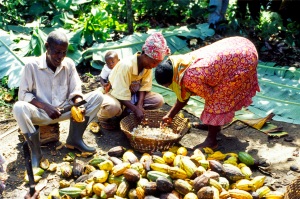A farmers’ co-operative is an independent organization of farmers who pool their resources for mutual benefit. Farmers have formed such co-operatives around the world ever since agricultural produce became commodities traded on exchanges. Co-operatives strengthen farmers’ bargaining power, help them survive volatile markets and reap the benefits of cooperation.
Cocoa farmers around the world were no exception. When the mass production of cocoa began in West Africa around the end of the 19th century, farmers in Ghana, the Côte d’Ivoire and other countries formed farmers unions and co-operatives to help each other with the physical labor required to clear brush, plant trees and, most importantly, to deal with the colonial authorities. Strikes and protests against low prices and lack of extension services were common during the first half of the 20th century. Today’s fair-trade co-operatives are simply a the most recent incarnation of that long-standing organizational form.
Fair-trade cooperatives play a significant role in connecting farmers with consumers along the fair-trade commodity chain. Their primary tasks are the collection and storage of cocoa beans before export, the provision of extension services, the provision of credit, and the distribution of the fair-trade and social premiums. How they do this varies according to the circumstances.
In Ghana, cocoa is king. It’s the most important export crop for the country and the Ghanaian government manages many aspects of the crop through the COCOBOD, the Ghanaian Cocoa Board. COCOBOD is the sole exporter of cocoa from Ghana, which means that all cocoa farmers have to sell their crop to the board. Since the reforms of the 1990s, the process of selling cocoa to COCOBOD has been liberalized and private produce purchasing companies buy the beans from farmers and sell them to the board. The threat of being exploited by unscrupulous middlemen was one of the key reasons Kuapa Kokoo was formed. The cooperative serves as a produce purchasing company that connects the farmers to the COCOBOD. Since Kuapa represents its65,000+ farmers, the farmers can rest assured that they are paid the legally set price.
Cocoa farmers in Ghana join Kuapa Kokoo as village societies. This isn’t odd because in the cocoa belt, entire villages are engaged in cocoa production. Each village society has elected representatives that serve at the district and national level, representing their local members. Those same representatives also are responsible for paying the local farmers for the cocoa they deliver to the collection centers. Kuapa Kokoo also distributes the social premium paid to farmers through the Kuapa Kokoo Trust. Individual village societies apply for funds from the trust to finance community projects like schools, water pumps etc.
Cocoa farmers in southern Belize represent just a small fraction of the farming population. Citrus and other produce are bigger crops than cocoa. Members of the Toledo Cocoa Growers Association, live scattered among the villages of the Maya mountains in southern Belize. Like its counterpart in Ghana, the TCGA represents its members to the cocoa buyers. Unlike in Ghana, there is no government marketing board, so the cooperative sells directly to the buyers. It also pays the farmers from the proceeds.
When it comes to the social premium, however, the TCGA follows a different methods. Since there are no village societies, the funds are used to create infrastructure that benefits all coop members, for example common facilities for drying the cocoa after fermentation to insure quality. The social premium also supports a scholarship fund for the children of cocoa farmers. The TCGA also provides extension services and helps farmer produce the best crop possible. Finally, the TCGA deals with issues of land tenure. Given that cocoa is a long term investment for farmers, security of tenure is crucial. But Maya traditions of communal land ownership can at times become a problem and the TCGA helps farmers negotiate in those conditions.
Farmers’ co-operatives are flexible organizations. The two examples above show how their structure and activities reflect the unique circumstances farmers face in different parts of the world. The common theme, however, is that they do what they do at the behest of their members and are therefore homegrown organizations that help give farmers a voice.
Filed under: cocoa, cocoa farmers, cooperatives, Kuapa Kokoo Tagged: #coops2012, Belize, Cote D’Ivoire, farmers’ co-operative, Ghana, UN International Year of Cooperatives
![]()
